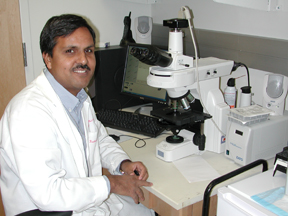 Cancer.
Cancer.
Just hearing the word can strike fear in people’s hearts.
And it’s been the hope of many a researcher to find its cure.
Rakesh Singh, Ph.D., is one of those researchers.
“Cancer is puzzling and can’t be defined as one disease,” said Dr. Singh, associate professor in the UNMC Department of Pathology and Microbiology. “It’s very complex and there is a lot of motivation to find a cure.”
Which is exactly what Dr. Singh hopes his research in tumor metastasis and angiogenesis will lead to one day.
|
|
Dr. Cohen said Dr. Singh’s research over the past few years has identified important new proteins regulating these processes, which potentially could be targets for therapeutic intervention. Findings, he said, that have received national and international recognition for their importance.
Dr. Singh first began to study tumor metastases and angiogenesis while working as a post-doctoral fellow at the M.D. Anderson Cancer Center in Houston, Texas.
It was there, he said, that he began to realize there is more to cancer than just the tumor.
“I was focused on how to use immune cells to kill tumors,” Dr. Singh said. “But I later realized that there is more to it. Most of the cancer death is not because of the primary tumor, but because of their metastasis and if we can understand how it metastasizes then we can fight it better.”
Dr. Singh said the overall goal of his research is to define the mechanism(s) that regulate the process of tumor progression and metastasis.
“Our current research activities have been focused on designing the strategies for inhibiting tumor-induced lymph angiogenesis and activating anti-tumor immunity and understanding the role of tumor-stromal interaction in tumor progression and metastasis,” he said.
“Since joining UNMC in 1995, Dr. Singh has grown tremendously as an independent researcher,” said Ira J. Fox, M.D., Charles W. McLaughlin Professor of Surgery and associate dean for research at UNMC.
Dr. Singh’s research has been funded entirely from outside the university, Dr. Fox said, and he personifies the kind of investigator that should be recognized for his contributions.
Dr. Singh credits the collaborative work environment at UNMC, saying it provides all the
opportunities in which a young researcher can grow. “It’s great to be recognized by such a prestigious award,” he said.
Dr. Singh will receive the award Friday at 3:30 p.m. during a presentation in the Eppley Science Hall Amphitheater. A symposium will immediately follow the presentation at which time Dr. Singh will present a talk titled: “Tumor Growth and Metastasis: Hijacking the Host.” A reception will follow the symposium.
Dr. Singh came to the United States in 1991 from India. He earned his B.Sc., M.Sc. and Ph.D. from Banaras Hindu University in Varanasi, India. He is married to Bhavana Dave, Ph.D., an associate professor of pediatrics, pathology and microbiology and associate director of the Human Genetics Laboratory in the Munroe-Myer Institute at UNMC.